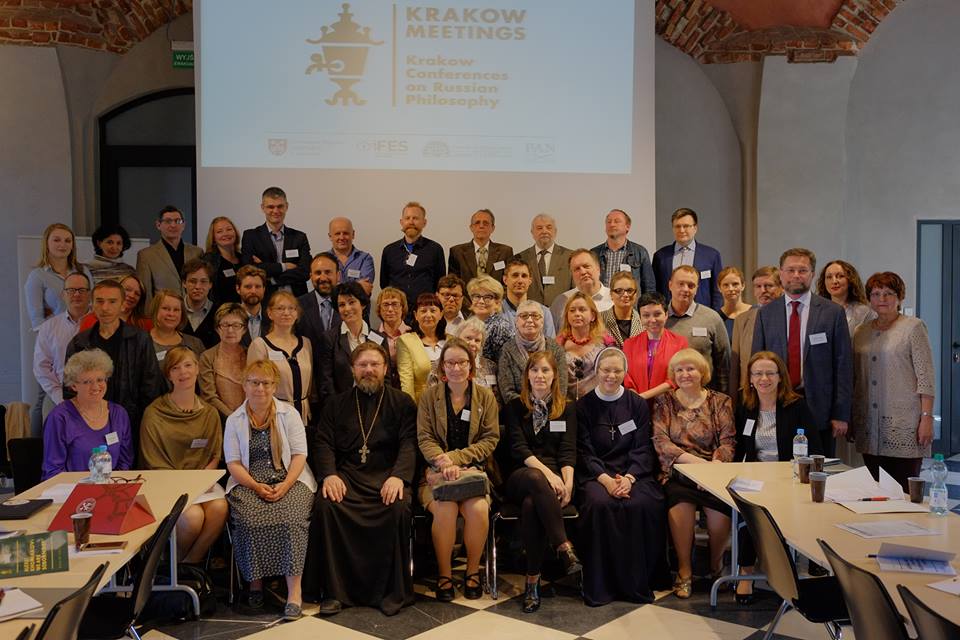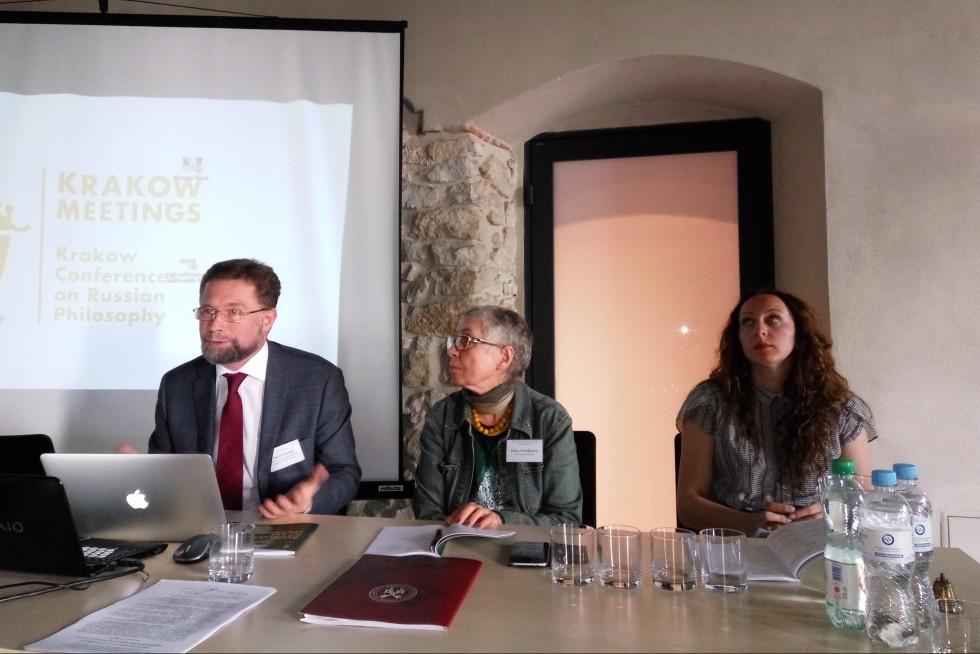A Conference on the Legacy of Alexei Khomyakov, held in Krakow, Poland

Photo: facebook.com/krakowmeetings
The 8th “Krakow Meetings” Convention on Russian Philosophy – organized by the Philosophy Faculty of the Papal University of John Paul II (Krakow), the Edith Stein Institute of Philosophy (Granada) and the International Centre for the Study of the Christian East (Granada) – brought together more than 50 people from Russia, Poland, Ukraine, Slovakia, Italy, Spain, France, Belgium, Sweden, England, Argentina, the USA, Israel and other countries. The group met in a Benedictine Abbey in Tyniec. Sister Teresa Obolevich, a Professor from the Papal University of JP II, led the conference’s scholarly committee.
St. Philaret’s representatives at the conference included Vice Rector Dmitry Gasak, Senior Lecturer Lydia Kroshkina and SFI graduate Inna Tkachenko.

Dmitry Gasak
One of the main questions posed in Khomyakov’s theological musings to his friends in Slavophile circles is the question of how Christianity developed differently on Russian and European soil. In his paper entitled “The idea of Christian Sobornost in Khomyakov: Projecting Church Unity onto Life in Society,” Dmitry Gasak considered the interrelationship between sobornost as a trait of the Orthodox Church and Slavophile ideas underpinning the foundation of societal unity in the Russia of his day, as well as the influence of ideas about sobornost on the church and society today. His paper asks whether now – when both Orthodoxy and anti-Christian state policy are relics of the past – it might be possible to find a “new synthesis of church and society, the religious and the secular.”
Lydia Kroshkina presented a paper entitled “Trying to Embody True Christian Sobornost: Mother Maria Skobtsova on A.S. Khomyakov and his Ideas”. Seeing in herself and her compatriots the call to practically embody the intuition of the Russian religious philosophers and Khomyakov in particular, Mother Maria strove not only to see the church’s cupola overhead, but to become one of its “living stones”. Ms. Kroshkina reminded us that “Pravoslavnoje Delo”, the organisation founded by Mother Maria in 1935, was not only a philanthropic organization, but first and foremost a community that was trying to live according to its understanding of personal sobornost, countering all false notions of relationship with real personal community.
Inna Tkachenko told us of how Alexei Khomyakov’s teaching on sobornost was embodied in his own Christian service.
The papers discussed the influence of Khomyakov’s thought on the Slavophiles and the Russian religious philosophical tradition as a whole. Specific topics covered included:
- how Khomyakov is reflected in the artistic inheritance of Nikolay Leskov (Marta Lukashevich, Warsaw University),
- the reception of the idea of sobornost in Metropolitan Anthony Khrapovitsky (Elena Borisova-Yurkovskaya, Warsaw University),
- Khomyakov’s influence on the creativity of members of the “Novosyolsky” Circle (Anna Reznichenko, Russian State University for the Humanities - RGGU),
- the presence of first-generation Slavophile ideas in the thinking of the neo-Slavophile circle which collected around the journal “Putj” (Oleg Marchenko, Russian State University for the Humanities - RGGU),
- reflections of the church-community concept in the Christian personalism of A. Meier and M. Privshin (Elena Knorr, St Tikhon’s Orthodox University),
- the reception of Khomyakov’s ideas in the creative work of Elizabeth Skobtsova (Natalia Likvintseva, the Alexander Solzhenitsyn Centre of Russian Émigré Studies).
The main conference topic was sobornost, which, with the passing of years, both conference organizers and participants find to be increasingly relevant. In admitting the importance of historical-philosophical investigation in this field, the organizers underscore, “the necessity of overcoming a kind of complex that makes study into a sort of exotic, philosophical archeology”; after all, when philosophy becomes exclusively about the study of the past, it ceases to be philosophy – and the same is true of theology.
The creators of the “Krakow Meetings” believe that the work of Khamyakov “stands before us today as a sort of provocation, helping us to defend Christian thought from the colonization of the modern, pulling it back out of the desert of Enlightenment abstraction so that it can again help today’s people to find an alternative – a space of love and truth in the living experience of Church.” Turning to Khomyakov’s inheritance, in which the church is revealed as “a living organism of truth and love steeped in the spirit of sobornost, connected with society and not reducible to a mere social institute or doctrine,” conference participants attempted to pull something for contemporary church and society out of Alexei Stepanovich’s thought.
The conference attracted participants from:
- Moscow State University,
- St. Petersburg State University,
- the Russian National Library,
- the National Research University School of Higher Economics,
- the Sergei and Evgeny Trubetskoj Education Fund,
- the A.F. Losev Library of Russian Philosophy and Culture,
- Cheropovets State University
- the University of Hasselt (Belgium),
- the College of St. Scholastica (USA),
- Stanford University,
- the University of Texas, Austin,
- the University of Marie Sklodowska-Curie (Poland),
- the Yuri Kondraktyuk National Technical University of Poltava (Ukraine),
- Université Jean Moulin Lyon III (France),
- the Slovak Academy of Sciences,
- Komensky University of Bratislava,
- University of Trnava (Slovakia),
- the Papal Catholic University of Argentina,
and other research and educational institutes.
